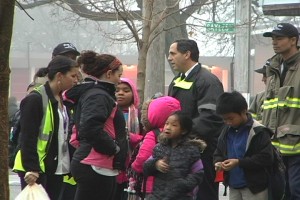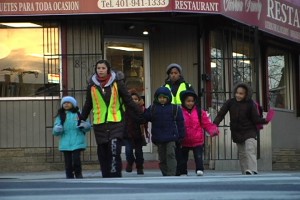A Providence elementary school introduces a new initiative that focuses on school absences and aims to get children, who walk to school, there and on time.
It’s the end of another school day at the Mary Fogarty Elementary School in South Providence and hundreds of kids scatter in different directions. Some take a bus home, while others meet their parents in the playground behind the school.
Then there are two dozen-plus children who are part of a new initiative called The Walking School Bus, aimed at making sure kids who have to walk, but are late to school or chronically absent, get there on time.
It’s a pairing of adult professionals and volunteers who help kids walk to and from school.
“The majority of the kids who were having problems with absenteeism lived within a mile of the school,” said Stephen Hourahan, chief advancement officer for Family Service of Rhode Island, a social service agency that launched the walking school bus program last year. It’s part of a children’s initiative project aimed at helping a specific neighborhood with a variety of needs, from healthcare to education. In this case Fogarty Elementary — in the heart of South Providence — is the pilot for the program.
There are similar programs in other parts of the country, but the focus is on obesity and exercise. This one is unique in that it focuses directly on absenteeism.
“Some kids live at home without parents,” Hourahan said. “Parents are on a third shift, they’re sleeping when the kid gets up to go to school. They just weren’t getting them to school.”
Ally Trenteseaux helps coordinate the walking bus. She and others who work for Family Service combine with community volunteers to get nearly three dozen children on three different routes to and from school every day. Half a dozen children from the Bailey Elementary School a few blocks away have their own route as well.
“Attendance has improved with all of the kids. They went from chronically absent to almost near or perfect attendance,” Trenteseaux said.
We tagged along in all kinds of weather. From a raw foggy afternoon to bitterly cold mornings that take your breath away. The walking bus is there every day. And so are the kids, gathering in the morning to go to school, then again in the afternoon to go home. The conversations are animated and the kids appreciate having company on what, for some, is a very long walk.
The School Department does not provide buses for elementary-aged children who live within a mile of their schools, which means some kids have to cross major intersections when they walk, including Broad Street.
“I’m scared to cross the intersections by myself, never mind with six kids when you only have two hands,” Trenteseaux said. “It’s scary and I’ve always wondered what happens to the kids we aren’t able to reach out to because we do have a wait list. They kind of just latch onto you and it’s great. New walkers play shy at first,’’ she added. “But they’ll latch right onto you, they’ll hold your hand, they’ll tell you stories. You learn so much about them in just the 20 to 25 minute walk.”
Scott Mello, a captain in the Providence Fire Department, volunteers two times a week. Mello oversaw the latest fire training academy and rotated in groups of recruits throughout this fall to walk with the kids.
“The age dilemma to them is very interesting,” he said. “To them, 21 years old is very old. So they think all the adults are 21. So they look at you and say, “Are you 21?'”
Family Service wants to expand the program, but needs volunteer walkers to supplement the professional staff. “The program coordination is very simple and something that we can handle easily. It’s just we need more manpower,” Trenteseaux said.
Most of the volunteers are hooked.
“We’re talking about simple solutions,” Hourahan said. “We’re not talking about something that’s rocket science; it’s very simple to get out and meet the kids, make sure they get to school on time, then go off and do your job. And if you can do it in the afternoon, come back and help us.”
We asked Mello what his pitch would be for prospective volunteers.
“You come and see what I’ve experienced. When you see little children coming out of their homes, in this weather alone, you’re going to want to go back and help out. You have to arrive, to achieve. If you don’t arrive at school, there’s no way they’re going to achieve or get any decent grades if they’re absent. It’s impossible.”
If you want to see the video version of this story go to www.hummelspotlight.org. If you know of a person or organization who you think deserves the Spotlight, send an email to info@hummelspotlight.org
